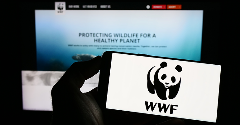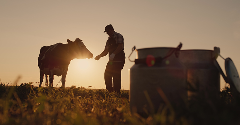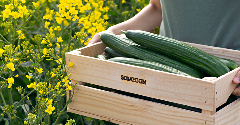News
JBS signs a deal with Royal DSM to cut cow methane emissions globally
17 Nov 2021As part of the COP26 meeting, the world’s largest meatpacker, JBS, announced it has partnered with the Netherlands' Royal DSM to reduce the total amount of methane emissions emanating from JBS’s supply chain. This partnership will begin by first reducing the emissions coming from JBS cattle.
JBS said that it will use Bovaer, a feed additive that DSM developed to reduce methane emissions. According to the meatpacker which cited a recent Australian study, Bovaer can reduce cow methane emissions by up to 90%.

While Bovaer has been widely tested in various markets, JBS said it would begin by giving this additive to confined cattle in its home country of Brazil. In six months, the company said it plans to expand its use of this feed additive into a second market, which will be either the U.S. or Australia.
As a solution, Bovaer is immediately effective using a dosage that is as little as a quarter of a teaspoon per day per animal. However, if the use of this additive is discontinued, the production of methane gas in a cow’s stomach will recommence immediately.
JBS, which is the second-largest food company globally, has broader plans than culling cattle methane emissions as part of its initiative to reduce methane emissions in its supply chains.
“Sustainability is at the core of our business strategy. We are developing a major action plan to reduce the company’s entire carbon footprint, and this partnership with DSM will contribute not only to our plans but for the whole sector in this complex issue of methane emissions,” said JBS Global CEO Gilberto Tomazoni in a statement.
Part of this meatpacker's larger plan is to invest $1 billion by 2030 to decarbonize its operations. JBS has also committed to zero deforestation across its global supply chain by 2035. As an extra incentive, the company has linked its executives' bonuses to its climate goals.
Related news

Soy story: WWF scores UK supermarkets on sustainability efforts
12 Nov 2025
WWF has published its latest “Soy Scorecard”, ranking UK supermarkets’ efforts to combat deforestation and land conversion in their soy supply chains.
Read more
Standing Ovation and Bel scale up casein production from dairy co-products
11 Nov 2025
Foodtech company Standing Ovation has partnered with cheese specialist Bel Group to manufacture dairy serums for industrial-scale casein production via precision fermentation.
Read more
New UPF standard hoped to offer consumers ‘coherence and clarity’
10 Nov 2025
Ingredients companies are being urged to enter “a new era of partnership and innovation” following the launch of the industry’s first non-UPF verification scheme.
Read more
Whistleblowers accuse UK meat industry of promoting cheap, unsustainable supply
7 Nov 2025
An anonymous group of industry insiders has accused the UK’s biggest food companies of systematically driving down meat quality and welfare standards.
Read more
Bord Bia presents Irish dairy ingredient suppliers at Fi Europe
6 Nov 2025
Dairygold Co-operative Society, The Carbery Group, and Ornua Co-operative: Meet with sustainable producers of Irish dairy ingredients at Food ingredients Europe 2025, Hall 7.2 Stand M18.
Read more
AI attraction means foodtech startups must ‘prove’ rather than ‘promise’
4 Nov 2025
Reports suggest that artificial intelligence (AI) is sucking investment from foodtech and agritech, but investors say the picture is complicated.
Read more
Penguin and Club bars no longer classed as chocolate
30 Oct 2025
Penguin and Club bars can no longer be classified as chocolate after the pladis-owned McVitie’s brands turned to cheaper alternatives amid the ongoing cocoa crisis.
Read more
Could plant-based protection replace plastic packaging?
29 Oct 2025
Swedish foodtech company Saveggy has launched an additive-free plant-based protection for cucumbers, offering a waste-free packaging solution for fruit and vegetables.
Read more
Does promoting protein content push up plant-based sales?
27 Oct 2025
Promoting the protein content of meat-free products is a more effective sales strategy than adding carbon labels, a study of UK bakery chain Greggs suggests.
Read more
Amazon Grocery launch aims to balance quality with affordability
22 Oct 2025
Global e-commerce giant Amazon has introduced a new private-label food brand, combining existing Amazon Fresh and Happy Belly products with new everyday items.
Read more